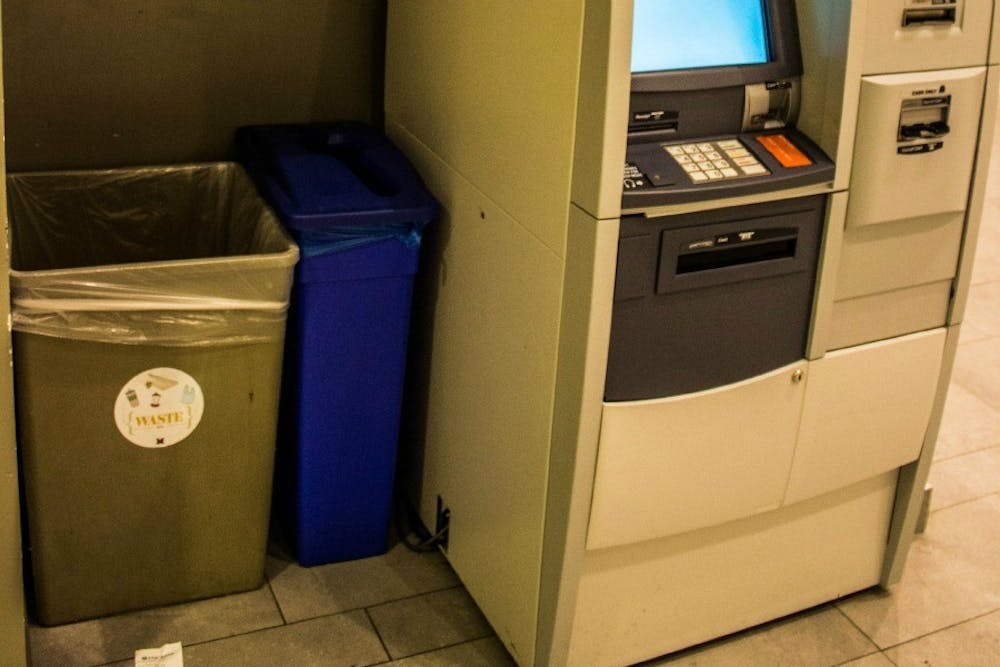By Elizabeth Hansen, Assistant Culture Editor
Sifting through trash is not a glamorous job. In fact, the only time it seems socially acceptable is when Krispy Kreme throws away perfectly good donuts at the end of the night. Like those Krispy Kreme dumpster divers, Erin Graves knows that not all trash is trash. But what she seeks to save is not that perfectly glazed donut -- it's the environment.
Graves is the president of Eco Reps, an environmental organization focused on promoting sustainability throughout residence halls. Eco Reps perform "trash audits," in which they sift through the garbage in residence halls to pick out the recyclable items students mistakenly throw away. Recently, they found that 30 percent of what was thrown away in residence halls -- not including the bathroom -- could have been recycled.
It was during one of these trash audits that the Eco Reps found a trend in the trash.
"We found a lot of disposable plastic water bottles that people just threw away. They didn't even recycle them," Graves said. "So we said, 'We should offer some nice alternative to these plastic water bottles.'"
In hopes of meeting this goal, the Eco Reps set a goal: Raise enough money through sponsorships to purchase 500 water bottles to be distributed at Mega Fair.
"Our goal with the Water Bottle Project is to get every first-year student a nice reusable water bottle so when they get here they don't have to go purchase them or the disposable water bottles," said Graves.
After hearing about the Water Bottle Project at Earth Fest last semester, many environmentally-minded organizations at Miami, including the Institute for the Environment and Sustainability, immediately supported the campaign.
"I would really like to see people around here stop buying so much bottled water," Jonathan Levy, director of the Institute for the Environment and Sustainability, said. "There are a lot of problems involved with buying bottled water: There's a lot of energy involved with its production and transportation. There's a huge CO2 footprint. The irony is that water coming out of the tap here in Oxford is safe and is regulated more strictly than bottled water."
The enormous support Eco Reps received from Levy and others allowed them to raise enough money to purchase 1,000 water bottles --twice their original goal.
"We had a table and a big sign that said 'Eco Reps' and 'free water bottles' [at Mega Fair]," Graves said. "People just flocked to it. We were [out] within an hour. It was awesome."
Rob Abowitz, Eco Reps advisor and associate director of Miami's Residence Hall Association, sees the purpose of the Water Bottle Project as twofold.
Awareness, Abowitz said, is first on the docket.
"[We want to] raise awareness of the problem that disposable water bottles create, raise awareness about the Eco Reps and raise awareness for the other sponsors [of the Water Bottle Project]," said Abowitz. "Our second goal is to reduce the number of plastic water bottles that people are using. It's a goal, but it's hard to measure."
Sophomore Monnett Hamilton supports the Eco Reps' initiative to curtail waste.
"My environmental [studies]professor explained that it takes 17 million barrels of oil each year to make water bottles for the U.S. market. I have been reusing bottles ever since," said Hamilton.
But not all students will be quick to change their old habits. Levy said it will take time for the effects of the Water Bottle Project to manifest.
"I was shocked when I went to Kroger the other day. I saw so many students just buying huge packages of bottled water," said Levy. "But if we can provide some good, environmentally sound water bottles, and if we do provide them for free, then it will just encourage more of this [responsible] use."
The Eco Reps' next step is to find ways to get the students and RAs living in the residence halls more involved.
"If we can get more people involved and get more Eco Reps from every building, I think it would have a bigger impact," Graves said. "That's what we're going to work on this year -- getting ourselves out there and getting more people and power."
But for now, Abowitz is proud of the Eco Reps' efforts to bring the Water Bottle Project to fruition.
"Quite honestly, I was skeptical [of whether it could be done]," Abowitz said. "But this leadership team did a great job of following through with the project, finding funding, and showing up before school started to unscrew the bottles and put all the inserts in.
"The Eco Reps leadership team really came through."

